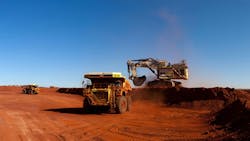A Robust US Mining Industry Means More Manufacturing, More Jobs
One surprise of the current, tumultuous presidential election cycle is the degree to which manufacturing has emerged as a significant campaign issue. Candidates are now openly pledging to oppose trade agreements perceived as hurting the nation’s manufacturers. And while trade policy is only one aspect of the overall debate, it’s clear that candidates are recognizing manufacturing’s importance to America’s economy.
A quick glance at the nation’s industrial landscape tells a profound story: America has lost more than five million manufacturing jobs since 2000, with more than 50,000 factories closed.
Several factors are involved, but one critical aspect remains overlooked—the connection between America’s mining industry and the health of the nation’s manufacturing base.
Metals and minerals are integral to the American standard of living. Thanks to not-so-small luxuries like cars, homes, roads, and electronics, young Americans today will depend in their lifetime on an estimated 27,416 pounds of iron ore, 978 pounds of copper, 521 pounds of zinc, and 1.8 ounces of gold.
And then there are the industries of tomorrow. For example, one wind turbine requires 8,000 pounds of copper. A hybrid car requires nine pounds of nickel, and the average electric vehicle battery contains nine pounds of lithium.
All of this means mining, and the countries that produce these minerals and metals will reap the benefits in terms of jobs and economic growth. In 2012, U.S. mines directly employed more than 630,000 workers, for wages totaling $46 billion.
The estimated value of mine production in 2015 exceeded $78.3 billion.
America’s miners are busily extracting everything from copper, zinc, and gold, to silver, nickel, and iron—the very raw materials used by the nation’s manufacturers to produce auto parts, high-tech appliances, industrial machinery, and steel.
Unfortunately, America’s mining industry is not living up to its full potential. New mining operations are being artificially constrained due to a duplicative and drawn-out mine permitting process. The result is a troubling delay in the opening of new mines, and longer wait times when manufacturers require key metals and minerals.
In fact, shortages of metals have become an important issue for America’s manufacturing executives, and in a 2014 survey, 90% of them expressed concern about obtaining needed minerals in a timely fashion.
Procuring domestic metals and other raw materials for U.S. factories should be a simple matter. After all, the United States possesses mineral wealth worth an estimated $6.2 trillion. But despite this vast capacity, the United States was forced to import roughly $32 billion worth of processed minerals in 2015. It’s a stunning level of dependency, with America now heavily import-dependent for 43 key minerals.
This is where Washington is finally getting involved. The current U.S. mine permitting process can take roughly a decade to complete, thanks to lengthy paperwork requirements and redundancy. In contrast, mine permitting in countries like Australia and Canada, which maintain comparable environmental standards, takes only two to three years.
Imagine if America’s mine permitting process could be reduced to a very reasonable two years, thus helping the nation’s factories to enjoy more timely access to important metals like iron, gold, and nickel.
Faster permitting could allow U.S. mines to potentially replace half of current mineral imports, reducing the minerals trade deficit by $16 billion annually, and increasing mining employment by about 125,000 workers. Expanding America’s mining work would also grow jobs in manufacturing sectors that currently produce mining equipment and supplies.
Fortunately, the Senate recognizes the inefficiency of the situation and recently passed Sen. Lisa Murkowski’s (R-AK) energy legislation, which includes a provision to improve access to minerals critical to the sustained success of the manufacturing industry.
If Washington is serious about aiding the nation’s manufacturers, the time has come for Congress to deliver legislation to the president that reforms America’s antiquated mine permitting process and revitalizes two industries that have long supported the nation’s middle class.
Harry Moser is the founder of the Reshoring Initiative.
